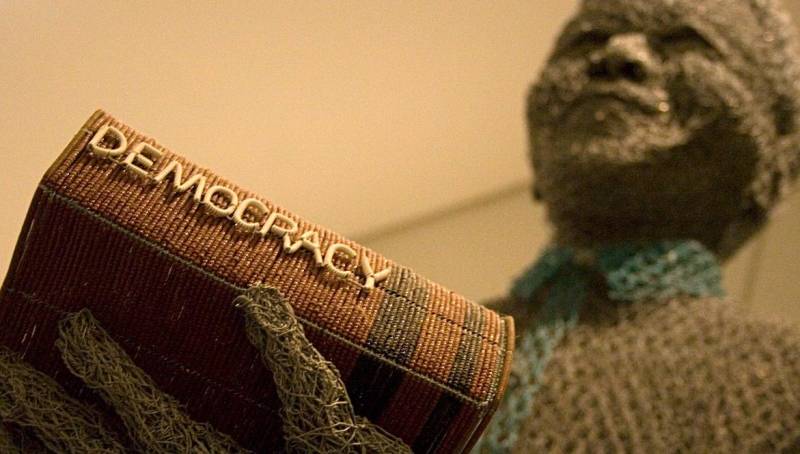Democracy is incompatible with Islam. This is a claim that is made these days by many inveterate followers of the religion. Some of them are young people who, disillusioned by the fruits of democracy, take to social media to voice their support for an Islamic system of government. Some are religious leaders and their affiliated parties who proselytise, in the face of official bans and persecution, the demise of democracy and the advent of a global caliphate.
Do they have this right? Is democracy really incompatible with Islam? There is an accepted precept in Islam that any assertion about right or wrong, acceptable or unacceptable must be supported by evidence - or ‘daleel’ in Arabic. And this evidence must be from original Islamic sources. These include the Quran, the sayings and the life of the Prophet (SAW) and also those of his companions - especially the four caliphs who were his immediate successors - Abu Bakr, Umar, Uthman and Ali.
The Quran is silent on the specific issue of a system of government for the Muslims. So we have to look further afield to the Prophet Muhammad and his companions for an answer. When he died, the Prophet did not nominate a successor. This was a conscious decision. He was aware that the end was near several days before he died. He could have named his successor at any time. But he did not. There was a message here, as there was in everything he did, for the Muslims: He did not want to set a precedent in which an Islamic ruler names his successor. The inference is that systems of government in which a ruler names or selects his successor are not acceptable in Islam.
What then, is acceptable? For this we have to look at what happened after he died. The events are related in detail in Ibn Hisham’s As-Seerah An-Nabawiyya, one of the oldest and most reliable accounts of the life and times of the Prophet. The leaders of the main communities - the Muhajireen and the Ansar - met in the ‘Sakeefa’ or hall of the Bani Sa’idah. Here a vigorous debate took place about who should become the leader of the Muslims. Finally agreement was reached that Abu Bakr would be the leader. And so an important precedent in Islam was established: The Muslims were to choose their leaders themselves. The ‘daleel’ here suggests a certain democratic element in the Islamic system since democracy, at its core, means that people select their own leaders.
Listen then to what Abu Bakr, the first Islamic ruler had to say to his people in his first speech after his ‘election’ as related by Ibn Hisham: “Oh people, I have been made responsible to lead you. But I am not the best amongst you. So If I do the right thing help me and support me. And if I do wrong, discipline me. And truth is a responsibility. And falsehood is treason. And the weak amongst you is powerful in my eyes until I return his right to him. And the powerful amongst you is weak in my eyes until I take the dues that he owes (to the weak).”
Similar statements are attributed to Abu Bakr’s immediate successors Umar ibn Al-Khattab and Ali ibn Abi Talib. These statements establish another ‘democratic’ principle: People are required to discipline their leader if he does wrong. The term ‘discipline’ here has been widely interpreted to imply, for example, that people are obliged to guide him and give wise counsel - the term in Arabic is ‘Shura’ - which in the modern world may well be called a ‘consultative assembly’. It has also been interpreted to suggest that if the leader fails in his duties the people are obliged to remove him.
This is only a small sampling of the ‘daleel’. A full review of the original sources strongly reinforces the view that there is nothing fundamentally incompatible between democracy and Islam.
That having been said, there are elements of modern Western democracy that are indeed repugnant to Islam. The power of representative assemblies in Islamic states is circumscribed. They cannot change what the Qu’ran and Sunnah have irrevocably established. But they are indeed free to legislate on a host of other issues critical to the well being and organization of society.
Some Islamic scholars - among them Dr. Yusuf Al-Qaradawi, the Al-Azhar qualified author of an authoritative book on the subject entitled ‘Min Fiqh Ad-Dawlah fil Islam’ (Law of the State in Islam), goes so far as to say: “Whoever contemplates the fundamentals of democracy will find that it is in harmony with the essence of Islam.”
Monday, November 25, 2024
Democracy and Islam

The writer is Chairman of Mustaqbil Pakistan
Govt won't tolerate disruptions amid PTI protests: Azma Bokhari
4:17 PM | November 24, 2024
Ahsan Iqbal: Public rejects PTI protests, warns of strict action
3:42 PM | November 24, 2024
Gallup survey: 47pc of Pakistanis never used trains
3:13 PM | November 24, 2024
Adiala Jail surrounded as routes blocked for PTI protest
3:04 PM | November 24, 2024
Government vows to prevent disruptions amid PTI protest call
3:02 PM | November 24, 2024
-
Digital nomadism redefines work and travel across the globe
-
Digital nomadism redefines work and travel across the globe
-
Lahore tops global pollution rankings as smog worsens, AQI reaches hazardous levels
-
Hunger crisis to increase in South Sudan, warns UN
-
Pakistan’s judiciary champions climate justice at COP29 in Baku
-
Punjab struggles with persistent smog as Met Office forecast rainfall
Investing in IT
November 24, 2024
Political Limbo
November 24, 2024
Parachinar in Crisis
November 24, 2024
Paper Justice
November 23, 2024
No Silver Bullet
November 23, 2024
Artificial Intelligence Revolutionises Healthcare
November 24, 2024
SNGPL gas and RLNG cargos
November 24, 2024
De-Dollarisation
November 24, 2024
Break Free From Plastic
November 24, 2024
Escalating Perils
November 24, 2024
ePaper - Nawaiwaqt
Nawaiwaqt Group | Copyright © 2024





